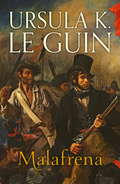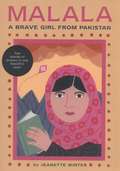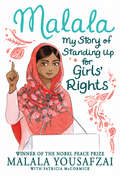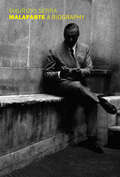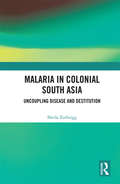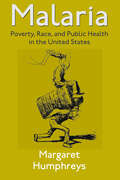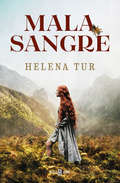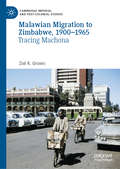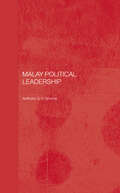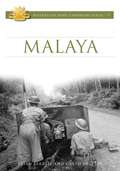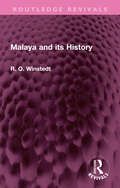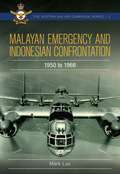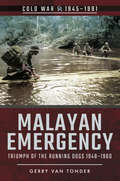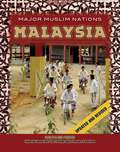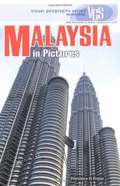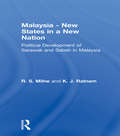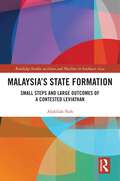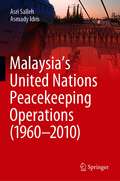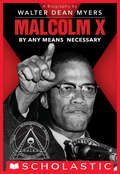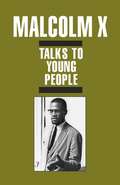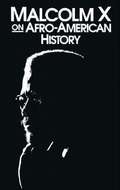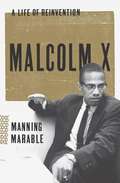- Table View
- List View
Malafrena
by Ursula K. Le Guin'Her worlds have a magic sheen ... She is unique. She is legend' THE TIMES'Le Guin is a writer of phenomenal power' OBSERVERAmong the less-travelled mountains and plains of Central Europe, a little east of Austria perhaps and north of Slovenia, lies the old kingdom of Orsinia. A land of forests and quiet farmlands and towns, with its capital city Krasnoy on the broad Molsen River, Orsinia has always found itself, like all the countries of Europe, subject to forces beyond its borders. Val Malafrena is an estate in the rural western provinces of Orsinia, far removed from the engines of European politics and content for it to remain so. When Itale Sorde, the idealistic young heir to Val Malafrena, leaves his family home to venture to the bustling capital city of Krasnoy, it is therefore very much against his father's wishes. Sorde's intention is to work as a journalist, but he will soon find himself moving from reporter on the great events of the day to active participant in the rising tide of revolution that seems destined to sweep the continent.
Malala, a Brave Girl from Pakistan and Iqbal, a Brave Boy from Pakistan: Two Stories of Bravery
by Jeanette WinterMeet two heroes of Pakistan who stood up for the rights to freedom and education in these inspirational nonfiction tales from acclaimed author-illustrator Jeanette Winter. Two stories of bravery in one beautiful book—including the story of Malala Yousafzai, a winner of the 2014 Nobel Peace Prize!
Malala: My Story of Standing Up for Girls' Rights
by Sarah J. Robbins Malala YousafzaiA chapter book edition of Nobel Peace Prize winner Malala Yousafzai's bestselling story of courageously standing up for girls' education. Malala's memoir of a remarkable teenage girl who risked her life for the right to go to school is now abridged and adapted for chapter book readers. Raised in a changing Pakistan by an enlightened father from a poor background and a beautiful, illiterate mother, Malala was taught to stand up for what she believes. Her story of bravery and determination in the face of extremism is more timely than ever. In this edition, Malala tells her story in clear, accessible language perfect for children who are too old for Malala's Magic Pencil and too young for her middle-grade memoir. Featuring line art and simplified back matter, Malala teaches a new audience the value of speaking out against intolerance and hate: an inspiring message of hope in Malala's own words.
Malaparte: A Biography
by Maurizio SerraA sweeping, definitive biography of the polarizing Italian writer whose infamous politics, relationship with Mussolini, and irrepresable knack for invention made him one of the most provocative artists and thinkers of his time.Curzio Suckert (1898–1957)—best known by his pen-name Malaparte—was not only a literary master but one of the mystery men of twentieth-century letters. The son of a cosmopolitan German businessman, his mother an Italian, Malaparte led a life that was intimately entwined from start to finish with the twentieth century's troubled history, and only recently has it become possible to begin to separate fact from the screen of fictions with which he continually surrounded himself.Diplomat and novelist Maurizio Serra tells the story of a precocious child who hurried to enlist in the French Army and endured the horrors of trench warfare in World War I. Taking up the pen of the journalist in the interwar years, Malaparte both allied himself and fell out with Mussolini, writing his provocative bestseller The Technique of the Coup d'Etat to popularise the lessons of the Bolshevik revolution and the fascist March on Rome before being sent into exile in provincial Italy. During World War II, Malaparte reported from the Eastern Front, joined forces with the occupying Allies after Mussolini's fall, and secretly wrote the first of his two masterpieces, Kaputt, a record of wartime enormities and atrocities that is as stylish as it is hellish. With The Skin, a black comedy about the American Army in Naples, Malaparte cemented a reputation for daring and disturbing originality. A polymath and shapeshifter—fascist, communist, a converted Catholic on his deathbed—a self-mythologizer on the move between society salons, the corridors of power, and the frontlines, Malaparte is a complex and fascinating subject.
Malaria in Colonial South Asia: Uncoupling Disease and Destitution
by Sheila ZurbriggThis book highlights the role of acute hunger in malaria lethality in colonial South Asia and investigates how this understanding came to be lost in modern medical, epidemic, and historiographic thought. Using the case studies of colonial Punjab, Sri Lanka, and Bengal, it traces the loss of fundamental concepts and language of hunger in the inter-war period with the reductive application of the new specialisms of nutritional science and immunology, and a parallel loss of the distinction between infection (transmission) and morbid disease. The study locates the final demise of the ‘Human Factor’ (hunger) in malaria history within pre- and early post-WW2 international health institutions – the International Health Division of the Rockefeller Foundation and the nascent WHO’s Expert Committee on Malaria. It examines the implications of this epistemic shift for interpreting South Asian health history, and reclaims a broader understanding of common endemic infection (endemiology) as a prime driver, in the context of subsistence precarity, of epidemic mortality history and demographic change. This book will be useful to scholars and researchers of public health, social medicine and social epidemiology, imperial history, epidemic and demographic history, history of medicine, medical sociology, and sociology.
Malaria: Poverty, Race, and Public Health in the United States
by Margaret HumphreysThis is the story of a war against a disease that we can never win but must continue to fight.In Malaria: Poverty, Race, and Public Health in the United States, Margaret Humphreys presents the first book-length account of the parasitic, insect-borne disease that has infected millions and influenced settlement patterns, economic development, and the quality of life at every level of American society, especially in the south.Humphreys approaches malaria from three perspectives: the parasite's biological history, the medical response to it, and the patient's experience of the disease. It addresses numerous questions including how the parasite thrives and eventually becomes vulnerable, how professionals came to know about the parasite and learned how to fight them, and how people view the disease and came to the point where they could understand and support the struggle against it. In addition Malaria: Poverty, Race, and Public Health in the United States argues that malaria control was central to the evolution of local and federal intervention in public health, and demonstrates the complex interaction between poverty, race, and geography in determining the fate of malaria.
Malaria: Poverty, Race, and Public Health in the United States
by Margaret HumphreysFrom a prominent medical historian, “a fascinating story of the spread of malaria through the USA following its introduction in the seventeenth century” (Nature Medicine).Margaret Humphreys presents the first book-length account of the parasitic, insect-borne disease that has infected millions and influenced settlement patterns, economic development, and the quality of life at every level of American society, especially in the south and during its peak in the nineteenth century.Humphreys approaches malaria from three perspectives: the parasite’s biological history, the medical response to it, and the patient’s experience of the disease. It addresses numerous questions including how the parasite thrives and eventually becomes vulnerable, how professionals came to know about the parasite and learned how to fight it, and how people view the disease and came to the point where they could understand and support the struggle against it.In addition Malaria: Poverty, Race, and Public Health in the United States argues that malaria control was central to the evolution of local and federal intervention in public health, and demonstrates the complex interaction between poverty, race, and geography in determining the fate of malaria.“A masterpiece . . . recommended reading for anyone involved in or interested in health care.”?Southern Medical Journal“The lack of jargon makes the book accessible to a wide audience.”?Journal of the History of Medicine
Malasangre
by Helena TurUna tierra teñida por la sangre de cuatro niñas. Una joven dispuesta a arriesgar su vida por los demás. Una poderosa historia de amor. En la segunda mitad del siglo XIX, Henar, una joven huérfana, viaja hasta el Bierzo para trabajar en una granja de abejas. Coincidiendo con su llegada, comienzan a aparecer en la comarca niñas asesinadas, con un corte en el cuello y el cadáver sin sangre. En medio de este ambiente opresivo, Henar descubrirá el amor que no conoció en su infancia, al encariñarse de la hija de los señores, a la que cuida y protege como si fuera de su familia, y conocerá la pasión en los brazos de un atractivo buscavidas que huye por una estafa. Pero en un lugar inhóspito donde nadie es quien dice ser ¿es posible confiar en un extraño? La verdad está escrita en la sangre. «Pasaron dos minutos quese le hicieron eternos. No era una persona paciente y la necesidad de saber qué ocurría allí dentro era tan fuerte como su temor a entrar. Notaba cómo ambos impulsos luchaban entre sí: deseaba asomarse, pero no quería delatar su presencia. De pronto, se sintió perdida. Alguien, a su espalda, la agarró por la muñeca de la mano que empuñaba la navaja y se la retorció hasta que tuvo que soltarla, al tiempo que con la otra mano le tapaba la boca para impedir que gritara. Henar entró en pánico al sentir el aliento de su agresor en el cuello. Tal vez esos fueran sus últimos instantes de vida.» Reseña:«Helena Tur nos ofrece una joven protagonista apasionada que ansía conocer todo lo que le rodea y seguramente os cautivará por su fuerza e ímpetu. Es una mujer que se sale de lo establecido.»Blog Letras en vena. « Me ha dejado una sonrisa en la cara y con muy buenas sensaciones.»Blog Adicción a los libros.
Malawi
by A. Hülsbömer P. BelkerMalawi is a small country by African standards. This handbook guides the visitor through this very foreign land, giving suggestions for day trips and tips on how to make a holiday here an unforgettable experience.
Malawian Migration to Zimbabwe, 1900–1965: Tracing Machona (Cambridge Imperial and Post-Colonial Studies)
by Zoë R. GrovesThis book explores the culture of migration that emerged in Malawi in the early twentieth century as the British colony became central to labour migration in southern Africa. Migrants who travelled to Zimbabwe stayed for years or decades, and those who never returned became known as machona – ‘the lost ones’. Through an analysis of colonial archives and oral histories, this book captures a range of migrant experiences during a period of enormous political change, including the rise of nationalist politics, and the creation and demise of the Central African Federation. Following migrants from origin to destination, and in some cases back again, this book explores gender, generation, ethnicity and class, and highlights life beyond the workplace in a racially segregated city. Malawian men and women shaped the culture and politics of urban Zimbabwe in ways that remain visible today. Ultimately, the voluntary movement of Africans within the African continent raises important questions about the history of diaspora communities and the politics of belonging in post-colonial Africa.
Malay Political Leadership
by Tony ShomeThis book demonstrates how particular values and 'notions of leadership', which underpinned traditional Malay leadership, have played a crucial role in the political evolution of the modern Malaysian nation. The author discusses the nature of Malay 'notions of leadership', and considers this throughout the Malay world at the local as well as at the national level, and goes on to describe and analyse leadership from pre-independence leadership in the colonial period through the rule of Malaysia's four prime ministers. He draws on anthropology, psychology, and political and economic history to show how Malay leaders have kept within the established track of the Malay value system, responding in particular to the expectation of their people to provide a sense of national identity and unity against the complex background of the Malaysian 'mosaic', while addressing the needs of the wider multi-ethnic community. Throughout the evolutionary development of Malay leadership, symbolisms for the perpetuation of leadership veneration persisted in its institutions and in the sublime power of the sultans. The Malay case offers one of the most remarkable studies of leadership, in its attempt to maintain indigenous primacy in a large multi-racial environment, subscribing to western democracy for its governance while retaining conservative Islamic values. This book is a significant contribution to the understanding of the evolution of leadership. It begins with an explanation of the early Malay World belief system and progresses to the period of colonization and nationalism. It then follows through the dynamics of modern politics encapsulating the biographical profiles of all Malaysia's Prime Ministers - Tunku, Razak, Hussein, and Mahathir - in three aspects: national unity, the economy and foreign affairs. The analysis of Mahathir's leadership extends into the new millennium. This is the only book with biographical profiles of all of Malaysia's Prime Ministers. This book will be of interest to students, academics, politicians, foreign affairs specialists and any reader interested in leadership studies and about Malaysia's political and economic history.
Malaya 1942 (Australian Army Campaigns Series #5)
by Brian Farrell Gareth PrattenWhen Imperial Japan unleashed the Pacific War in December 1941, Australian forces went into action, as part of a larger British Empire force, to defend Malaya and Singapore. Australia's principal contribution to defending Malaya and Singapore was the 8th Division. Originally raised for service in the Mediterranean, the division was committed piecemeal to Malaya and its performance was bedevilled by poor command decisions in the face of an enemy better prepared on all counts for the campaign at hand. The 8th Division, however, also reflected some strengths of the AIF at large: stubbornness in positional defence, effective and flexible small unit tactics and leadership, and skill and determination in close quarter combat. Singapore was lost more in spite than because of Australian efforts, but its loss underlined Australia's strategic dependence on `great and powerful friends' during the Second World War.
Malaya and its History (Routledge Revivals)
by R. O. WinstedtFirst published in 1948, Malaya and its History is a history of Malaya ranging from the thousand years of Hindu influence to the eras of Portuguese and Dutch rule, and from the establishment of the British protectorate to Malayan independence in 1957. There are chapters on law, trade, industry and the social services. This book will be of interest to students of history, southeast Asian studies, and cultural studies.
Malayan Emergency and Indonesian Confrontation: 1950-1966
by Mark LaxAustralia&’s involvement in the Malayan Emergency from 1950 to 1960 and later in a confrontation with Indonesia in the 1960s is little remembered today. Yet the deployment of over a third of the RAAF to support the British and Malayan governments in what became a long war of attrition against communist insurgents in the former case, and against Indonesian regulars and militia in the latter, kept the RAAF engaged for over 15 years. Wars by another name, these two events led to the birth of Malaysia and the establishment of an ongoing RAAF presence in South East Asia. Until recent operations in Afghanistan, the Malaya Emergency was Australia&’s longest conflict. Malayan Emergency and Indonesian Confrontation recounts the story of the politics, strategies and operations that brought these two conflicts to a close.
Malayan Emergency: Triumph of the Running Dogs, 1948–1960 (Cold War, 1945–1991)
by Gerry van TonderWhen the world held its breath It is 25 years since the end of the Cold War, now a generation old. It began over 75 years ago, in 1944long before the last shots of the Second World War had echoed across the wastelands of Eastern Europewith the brutal Greek Civil War. The battle lines are no longer drawn, but they linger on, unwittingly or not, in conflict zones such as Iraq, Somalia and Ukraine. In an era of mass-produced AK-47s and ICBMs, one such flashpoint was Malaya By the time of the 1942 Japanese occupation of the Malay Peninsula and Singapore, the Malayan Communist Party (MCP) had already been fomenting merdeka independence from Britain. The Japanese conquerors, however, were also the loathsome enemies of the MCPs ideological brothers in China. An alliance of convenience with the British was the outcome. Britain armed and trained the MCPs military wing, the Malayan Peoples Anti-Japanese Army (MPAJA), to essentially wage jungle guerrilla warfare against Japanese occupying forces. With the cessation of hostilities, anti-Japanese became anti-British, and, using the same weapons and training fortuitously provided by the British army during the war, the MCP launched a guerrilla war of insurgency.Malaya was of significant strategic and economic importance to Britain. In the face of an emerging communist regime in China, a British presence in Southeast Asia was imperative. Equally, rubber and tin, largely produced in Malaya by British expatriates, were important inputs for British industry. Typically, the insurgents, dubbed Communist Terrorists, or simply CTs, went about attacking soft targets in remote areas: the rubber plantations and tin mines. In conjunction with this, was the implementation of Maos dictate of subverting the rural, largely peasant, population to the cause. Twelve years of counterinsurgency operations ensued, as a wide range of British forces were joined in the conflict by ground, air and sea units from Australia, New Zealand, Southern and Northern Rhodesia, Fiji and Nyasaland.
Malaysia
by Barbara Aoki PoissonBy almost any standard, Malaysia has become one of the most prosperous and successful nations in the Islamic world. The Malaysian economy has grown steadily, thanks to a focus on new technology and manufacturing. Although Malaysia's government is not fully democratic, it permits an increasing degree of public participation. This book examines the economic and political issue facing Malaysia today. It provides up-to-date information about the country's geography and climate, history, society, important cities and communities, and relations with other countries.
Malaysia in Pictures (Visual Geography Series)
by Francesca Di PiazzaIntroduces the geography, history, religious beliefs, government, and people of Malaysia.
Malaysia: New States in a New Nation
by R.S. Milne K.J. RatnamFirst Published in 1974. Routledge is an imprint of Taylor & Francis, an informa company.
Malaysia’s State Formation: Small Steps and Large Outcomes of a Contested Leviathan (Routledge Studies on Islam and Muslims in Southeast Asia)
by Abdillah NohTracing Malaysia’s political economy since 1800, Abdillah Noh argues that it has been substantially path-dependant based on choices made by the British colonial administration. Focusing mainly on two major groupings in Malaysia’s political economy – the Malays and Chinese Malaysians – Noh demonstrates that British policies engendered two processes. First, a less-than-full-retrenchment of Malay political dominance by preserving Malay de jure power and, second a less-than-full incorporation of new actors in Malaya’s political economy. Such decisions to preserve Malay de jure power alongside half-hearted measures at incorporating non-Malays’ economic and political presence created communities with mutually exclusive institutions that increasingly compete for access to political, social and economic resources. He thus reasons that Malaysia’s state formation - and the consequent consociational logic - is not a contrived act that was hatched at the point of its independence. Rather, it is the result of deep institutional processes that are centred on the idea of path dependence, self- reinforcement mechanism, timing and sequence. A valuable read for scholars of Malaysian history and politics, as well as for scholars of postcolonial state formation and public policy more broadly.
Malaysia’s United Nations Peacekeeping Operations (1960–2010)
by Asri Salleh Asmady IdrisSmall and developing states make up the majority of participants in United Nations Peacekeeping Operations (UNPKO), and Malaysia is one of these. The numerous previous studies on Malaysia’s UNPKO are primarily historical narratives which focus on practical, policy-related issues and due process, making no attempt to synchronize the nexus between theory and policy analysis. Nor do they cover the theoretical aspect which can operationalize and address the question of the roles played by Malaysia’s domestic actors (foreign policy executives, legislature, military, media, public opinion) in the respective decision-making processes as well as those of external level, such as international power politics and geopolitical considerations. In other words, they are predominantly a historical narrative of only several Malaysia’s UNPKO.This book fills the critical gap. It deliberates on the respective national and international decision-making processes, especially from the Malaysian point of view, and analyses the theoretical and practical impacts of Malaysia’s UNPKO in understanding international politics. Apart from providing a well-researched account of Malaysia’s UNPKO across the globe for 50 years, i.e. 1960-2010, this book examines the determinants by using qualitative data, particularly key-informant interviews and documentary analysis. Thus, while most studies of Malaysia’s UNPKO single out domestic imperatives as the most vital determinant, this book, on the contrary, comprehensively identifies the prevailing world security order as the most important determinant influencing Malaysia’s UNPKO, followed by the domestic ones.
Malcolm X (Scholastic Focus): By Any Means Necessary
by Walter Dean MyersA classic and highly acclaimed biography of civil rights activist Malcolm X, ever more relevant for today's readers.As a 14-year-old he was Malcolm Little, the president of his class and a top student. At 16 he was hustling tips at a Boston nightclub. In Harlem he was known as Detroit Red, a slick street operator. At 19 he was back in Boston, leading a gang of burglars. At 20 he was in prison.It was in prison that Malcolm Little started the journey that would lead him to adopt the name Malcolm X, and there he developed his beliefs about what being black means in America: beliefs that shook America then, and still shake America today.Few men in American history are as controversial or compelling as Malcolm X. In this Coretta Scott King Honor Book, Walter Dean Myers, winner of a Newbery Honor and four-time Coretta Scott King Award winner, portrays Malcolm X as prophet, dealer, convict, troublemaker, revolutionary, and voice of black militancy.
Malcolm X Talks to Young People (pamphlet)
by Malcolm XA selection of speeches from the book of the same title. Includes Malcolm's 1965 interview with the Young Socialist magazine.
Malcolm X on Afro-American History
by Alex Haley Malcolm X Betty ShabazzThrough this book, Malcolm X explains clearly how knowing the truth about your history is necessary for building a movement to tear down racism and build a better society. The point is that Black people have to become aware of their true accomplishments in the past in order to change the world in the present and future.
Malcolm X on Afro-American History
by Malcolm XRecounts the hidden history of the labor of people of African origin and their achievements.
Malcolm X: A Life of Reinvention
by Manning MarableSelected by The New York Times Book Review as a Notable Book of the Year Years in the making-the definitive biography of the legendary black activist. Of the great figure in twentieth-century American history perhaps none is more complex and controversial than Malcolm X. Constantly rewriting his own story, he became a criminal, a minister, a leader, and an icon, all before being felled by assassins' bullets at age thirty-nine. Through his tireless work and countless speeches he empowered hundreds of thousands of black Americans to create better lives and stronger communities while establishing the template for the self-actualized, independent African American man. In death he became a broad symbol of both resistance and reconciliation for millions around the world. Manning Marable's new biography of Malcolm is a stunning achievement. Filled with new information and shocking revelations that go beyond the Autobiography, Malcolm X unfolds a sweeping story of race and class in America, from the rise of Marcus Garvey and the Ku Klux Klan to the struggles of the civil rights movement in the fifties and sixties. Reaching into Malcolm's troubled youth, it traces a path from his parents' activism through his own engagement with the Nation of Islam, charting his astronomical rise in the world of Black Nationalism and culminating in the never-before-told true story of his assassination. Malcolm X will stand as the definitive work on one of the most singular forces for social change, capturing with revelatory clarity a man who constantly strove, in the great American tradition, to remake himself anew.
